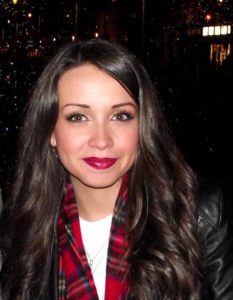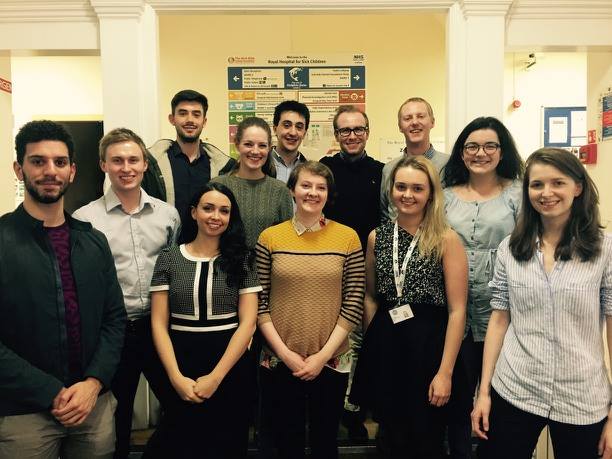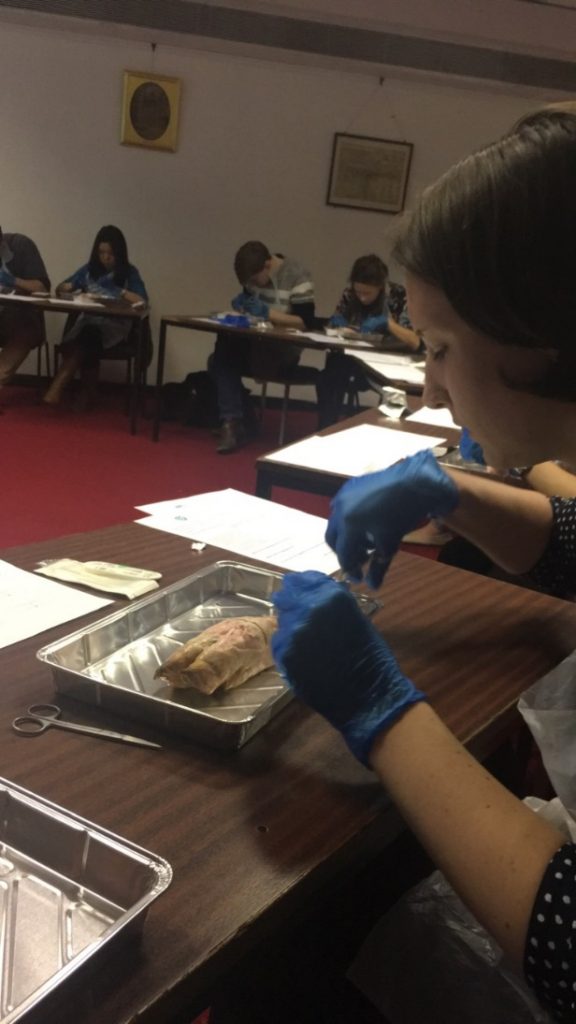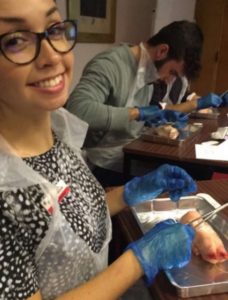Well done to Rachael on being a runner-up in the ‘Zeshan Qureshi Award for Outstanding Achievement in Medical Education’.

Rachael Boyle is a post-graduate student, currently in her 5th year of Medicine at The University of Edinburgh. She has recognised the difficulties that many students face in relation to the increasing costs of medical education, and has tackled this problem in her role in the Edinburgh Student Surgical Society by providing high quality, affordable tutorials. Rachael’s influence in practical skills training extends even further to encouraging volunteering with student support services and working as a Health Care Assistant – and her role in improving medical education doesn’t stop there.
Rachael Identified a huge problem; money
A study published in 2016 found that those from a lower socioeconomic background are much less likely to apply, or be accepted into UK medical schools. One factor which was identified as an obstacle for both applying to, and participating in medical school was cost. A huge amount of students’ education comes from sources out of the medical curriculum including textbooks, online resources and training courses.
“I am currently the Surgical Skills Tutorial Convenor for Edinburgh Student Surgical Society (ESSS) and I am committed to providing extra-curricular teaching at the lowest cost possible.”

She set out to solve this problem
Surgical skills courses using wet materials can cost anywhere from £50 to upwards of £500. However, at the end of 2016, I developed and introduced the society’s first ever surgical skills tutorials using biological materials. So far, we have taught over 30 students how to perform a basic tendon repair on porcine tendons. I have also developed and sourced materials for a Vascular Patch Angioplasty and Lesion Excision tutorials which we hope to run this forthcoming semester.
“These tutorials are delivered by surgical-trainees which not only ensures high quality education, but the opportunity for registrars to gain teaching experience too.”


And Overcame Difficulties along the way
Developing these tutorials has been challenging, as I have had to spend a lot of time producing tutorial slides and hand-outs; sourcing affordable equipment and materials and recruiting tutors. Furthermore, finding a venue which allows handling of biological material has been difficult and required me to write a formal protocol on material handling, disposal and equipment sterilisation.
“However, I am passionate about providing affordable education”
For a small yearly fee of £5, students can attend unlimited tutorials and other events provided by ESSS, including careers evening or conferences. In October 2016, I organised an event for nearly 70 people which was aimed at introducing younger medical students to surgery. Two experienced surgical staff spoke at the event to provide information and advice for those considering a career in surgery. There were also tutorials on practical skills in surgical scrubbing and gowning; suturing and knot-tying; and laparoscopy skills using simulation technology. This event received such positive feedback that I plan to run a second evening in the upcoming semester.
But her contribution to helping others doesn’t end there…
Another way in which I have helped to provide students with practical skills is through volunteering with a charity that provides a confidential support and information service for students.
“Our team underwent extensive training in communication techniques to be used in crisis situations, such as suicidality, abuse or unplanned pregnancies. I believe these skills are invaluable, and so I began training new recruits each semester.”
This involved producing written resources, conducting face to face role-play scenarios, and online practice sessions. The charity takes hundreds of calls each semester, and continues to expand both its services and volunteer base each year.
She’s even found time to work as a Healthcare Assistant and is helping others to do the same.
Working part-time as a Health Care Assistant for NHS Lothian provided me with a fantastic opportunity to further develop both my communication and basic medical skills.
“I thoroughly believe this hands on experience will better equip me for life as a doctor and feel other medical students would benefit too.”
This led me to work with NHS Lothian to promote health care employment among medical students by delivering talks and Q&A sessions. This was noticed by a doctor working at the university, who then approached me to gain advice and ideas on how such experience could gained by students on the medicine course. He has since incorporated a “team” rotation into the MBChB curriculum. Now, all 4th year medical students work as health care assistants for 2 weeks to gain experience in nursing care. I believe the skills gained from this to be invaluable.
And it’s not just the way we learn practical skills that Rachael is influencing.
As a dyslexic student, I have noticed that some materials seem to be much easier to learn from than others.
“I feel dyslexia actually gives me an advantage in determining ways in which content can be presented to make learning more efficient.”
Since 2014, I have regularly reviewed medical and scientific textbooks for Wiley-Blackwell Publishing’s. This has involved suggesting improvements for new editions of existing books, or advising on layouts, presentation and content of texts in development.
“I really enjoy looking for dynamic ways of presenting educational materials, such as introducing interactive online resources or developing methods for self-assessment.”
Right back to the first step in any doctor’s career: that daunting medical school application.
Finally, I have worked with the university by delivering information sessions for those looking to apply to medicine as post-graduates. This involves collating up-to-date information on the application process, resources helpful for the UKCAT or interviews, and delivering talks on my own experience in applying to Medicine as a post-graduate. Since starting this in 2014, I have gone on to informally mentor a number of applicants by organising interview practice sessions.
“I hope to continue to be more involved in medical education throughout my career as it is both rewarding and a privilege”.